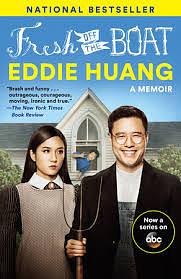Take a photo of a barcode or cover
I could not deal with how much he hated women. Each chapter got more and more egregiously misogynistic.
I really enjoyed the beginning of this book - Huang's voice perfectly captured the bratty little kid. But it turned out that was his current voice, not his attempt to recapture his childhood self. But I still really enjoyed when he talked about food.
funny
inspiring
lighthearted
medium-paced
Interesting, showed me a totally new perspective
I wanted to like the book, and there is a good overcoming oppression story at the heart of it, but the author is trying so, so hard to be cool and hip. I couldn't take it and didn't finish.
I loved this book! It's honest and introspective look at the cross-cultural experience that is being an Asian American. Although I didn't identify with some of Eddie Huang's personal encounters with drugs, jail, and hip hop, I felt like he put to paper some really complex emotions that I haven't been able to communicate. This book is witty, personal, and has a vibrant voice. It speaks about being throwing out the stereotypes and staying true to yourself. It's an essential read if you're interested in forgetting about preconceptions and learning about a culture that hasn't really been explored in the media.
“People ask me what my greatest strengths are and I say perspective. The best way to get that is to meet people that are polar opposites; you learn the most from them. There are pieces of you that are inherently yours, but everything else is a collection of the things you’ve seen and the people you’ve met.” - Eddie Huang, Fresh Off The Boat: A Memoir
“People ask me what my greatest strengths are and I say perspective. The best way to get that is to meet people that are polar opposites; you learn the most from them. There are pieces of you that are inherently yours, but everything else is a collection of the things you’ve seen and the people you’ve met.” - Eddie Huang, Fresh Off The Boat: A Memoir
It was funny at times, especially some of the parts about his childhood (though certainly not all--some were quite sad and poignant), but the painfully hip writing style became really grating after a couple hundred pages.
When I started this book I was completely enthralled; the writing was funny and on-point, even if (especially if?) Huang's life is so different from mine (and even if I did have to look up a few things on Urban Dictionary :)). I put his second book on hold right away and pretty much neglected everyone and everything just to read. But then a little after halfway through, I started to lose interest. I don't know if I was just grumpy or if it was the fact that Eddie at 30 is essentially still Eddie at 12 and it got tiresome and kind of seemed to be a contrived - "Being a badass rebel got me here and I'm never going to mess with the formula, son" - attitude. I'm glad I read it, and it was very interesting to get a peek into a life so different from my own, but I don't plan on reading the second book.
I was drawn to Fresh Off the Boat not because of the ABC sitcom it inspired, but rather because I find Eddie Huang an entertaining and intelligently irreverent guide to food and culture on Viceland's "Huang's World." I hoped to find a similar connection in his coming-of-age memoir from 2013.
Some parts are solid: contentious childhood relationships with demanding parents, struggles to define himself in schools and society, the opening of his Baohaus restaurant. But there are just too many episodic and self-congratulatory anecdotes that detract from broader narratives. It's his own life story, granted, yet every memoir is fundamentally a curated recollection. This particular memoir could've benefited from a much stronger curatorial touch. The language also proved distracting at times. I'd be thrilled to never again read references to "hypebeasts" or "steez" or any number of other terms.
A NY Times journalist recently compared Huang's writing to the voice of Junot Diaz's character Oscar Wao. It's an apt comparison, but Wao is a caricature. It's the real-life Huang who pens lines like: "My food was, is, and always will be ill." His food may be, but his writing in Fresh Off the Boat is not.
Some parts are solid: contentious childhood relationships with demanding parents, struggles to define himself in schools and society, the opening of his Baohaus restaurant. But there are just too many episodic and self-congratulatory anecdotes that detract from broader narratives. It's his own life story, granted, yet every memoir is fundamentally a curated recollection. This particular memoir could've benefited from a much stronger curatorial touch. The language also proved distracting at times. I'd be thrilled to never again read references to "hypebeasts" or "steez" or any number of other terms.
A NY Times journalist recently compared Huang's writing to the voice of Junot Diaz's character Oscar Wao. It's an apt comparison, but Wao is a caricature. It's the real-life Huang who pens lines like: "My food was, is, and always will be ill." His food may be, but his writing in Fresh Off the Boat is not.
I admit: I picked this one up because of the cover. Seriously, have you seen the cover? It's one of the best ones EVER. I love it when kids being kids is captured on film. Anyway, I had no idea who Eddie Huang was before I picked up this book. It's entertaining, funny, and a great insight into how it is being a first generation American and having parents who are fresh off the boat. This is a book about identity, race, culture, and perspective, and is well done.
The book wasn’t exactly what I thought it was going to be however it was enjoyable. Mostly I just like the end of the book because it was really interesting to see and hear how Eddie opened his restaurant. I would’ve like to hear more about that portion




